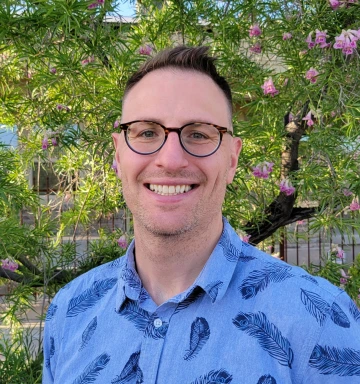Dr. Jonathan Tullis
Associate Professor, Educational Psychology
Assistant Professor, Cognitive Science - GIDP
Assistant Professor, Psychology
Dr. Jonathan Tullis is an Associate Professor in Educational Psychology and the head of the Cognition And Memory in Education and Learning (CAMEL) Lab. He received undergraduate degrees in Physics and Psychology from Dartmouth College in 2005, followed by a Master’s in Education from Notre Dame while teaching high school physics and chemistry. His classroom experiences sparked a deeper interest in understanding how best to structure lessons and activities to support student learning, which led him to pursue a Ph.D. in Cognitive Psychology at the University of Illinois. There, he studied how students control their own learning and how relations among studied information impacts memory and understanding. As a post-doctoral fellow at Indiana University, he extended this work by evaluating the effectiveness of applying fundamental cognitive techniques to real-world student learning contexts. Dr. Tullis’s research integrates basic cognitive science, mathematical modeling, and applied studies to investigate how learning environments can be designed to align with the strengths and limitations of human memory. His work aims to maximize the benefits of memory, minimize its weaknesses, and reduce the cognitive effort required of learners.

"I am inspired by so many colleagues who are passionate about understanding humans and making the world a better place for those humans. And, so many of my students who persevere through incredibly tough challenges and never give up on following their big dreams inspire me everyday."
Who do you draw inspiration from and why?
My family, colleagues, and students inspire me. I have learned so many important lessons from watching my husband set career and recreation goals. He dreams big about what could possibly be and then goes to work to build it. He shows impressive leadership to his team of faculty -- all while balancing those work responsibilities with fun and play. I have learned to set incredibly high standards from my mom, who constantly pushes people to be their best. I have learned a strong work ethic from my dad, who always put in an extra mile to help others, who was always curious about the world, and who loved analyzing data to understand situations. My dog Bernie inspires me to be joyful, as she exults in simple acts of chasing a ball and playing in a stream. I am inspired by so many colleagues who are passionate about understanding humans and making the world a better place for those humans. And, so many of my students who persevere through incredibly tough challenges and never give up on following their big dreams inspire me everyday.
What are one or two accomplishments of which you are most proud?
I am really proud of earning an NSF Career grant award, which allowed me to pursue research questions about how learners form and build connections between related information. This grant provided resources to support graduate students, to reach out and build connections with local educators, and to develop and test theories of human learning. We discovered so much by pursuing questions about what causes learners to connect related episodes in their minds and what the consequences of those connections are for learning. My second ongoing accomplishment is the unending development of my pottery throwing skills. I started taking pottery classes through Tucson Parks and Rec a few years ago and have slowly become pretty proficient at throwing functional mugs, bowls, plates, and vases. I get a lot of joy at being able to move mud into (approximately) the shape that I want it to be in – and I get a lot of humility when it refuses to cooperate.
"We discovered so much by pursuing questions about what causes learners to connect related episodes in their minds and what the consequences of those connections are for learning."
What advice would you give to your younger self?
Don’t be scared to be yourself – or even scared of getting to know yourself. Being excited about interests and following passions is fun and makes life worthwhile. This is still advice I am giving to current self…
What is something you are working on currently that you’re excited about?
I recently won the Center for University Scholarship distinguished fellowship to study how students can use generative Artificial Intelligence as a study tool. GenAI has been vilified in many sectors of education, but it represents a historic technological development that will likely fundamentally reshape learning and instruction. Using it appropriately may enable greater skill and knowledge development across a variety of domains and ages. Testing how to use it effectively to support learning (rather than replace thinking) can provide empirically-grounded recommendations for educators and students—and can develop theories of the fundamental processes of human learning.

